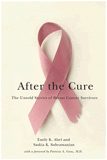After the Cure
encontrar mi
|
The first thing that caught my eye was the cover of the book: there’s a picture of a pink satin ribbon front and center. No big surprise there. After all it’s subtitled, The Untold Stories of Breast Cancer Survivors. But then I looked more closely, and, in fact, the right side of the ribbon is frayed, a bit ragged even. A little worse for wear, you might say.
And then it hit me: what a perfect visual to suggest life after cancer treatment.
For After the Cure, Drs. Abel and Subramanian collaborated on a fascinating research topic: how women who have completed breast cancer surgery, chemotherapy and radiation cope with ongoing problems that doctors often fail to take seriously.
With funding from the Susan G. Komen Foundation, they interviewed 74 breast cancer survivors, ladies at least one year past treatment who believed that they were experiencing physical, emotional or cognitive effects.
They searched for answers to a range quality of life questions such as:
- What sense do women make of symptoms that persist long after the end of treatment?
- What does it mean to live with these symptoms?
- How much do women blame themselves when they fail to return to "normal?"
- How do women react to doctors who fail to take the symptoms seriously?
The most common post-treatment symptoms reported by this group were cognitive impairment (‘chemobrain’) and fatigue. But patient concerns also included joint pain, hot flashes, dental and vision problems, insomnia, memory loss, fatigue and depression. Many of these complaints interacted simultaneously resulting in a sort of "post-breast-cancer-syndrome" that was rarely if ever validated "by the very doctors the women depended on to provide life-saving treatment." Based on the authors’ review and close analysis of their data, this syndrome has clearly had negative repercussions on the survivors’ professional and personal lives.
As a breast cancer survivor, my personal favorite chapter in the book explored chemobrain. Oh, how I could relate!
Reading After the Cure took me back in time to the days when I was going through chemo and working as an educational technology trainer. Every day I would stand and deliver workshops to audiences of teachers and make myself more than a little crazy with two semi-irrational fears: that my wig would fall off (or at the very least, shift noticeably left when I turned my head to the right), and that I might ‘go blank,’ totally forgetting the next item on the agenda.
The good news is that my wig hung on for dear life and never failed me onstage. But unfortunately chemobrain reared its ugly head with regularity and became an unwelcome part of my ‘new normal.’ During a presentation, synapses in my brain would fire on command, one after another, but somehow the intended targets for those thoughts seemed to move aside with a will of their own. When this happened, I would stop speaking momentarily and grope in vain for words that seemed just beyond my reach. After it happened a few times, I learned to take a deep breath and turn the situation into a joke, (I just wanted to check that you were all paying attention, folks). By the time I retired I could just blame my mental short circuits on middle-aged memory loss.
When I reported this to my oncologist, he acknowledged that he had heard this before, from lots of other cancer survivors. But it wasn’t clinically significant because at that point in time there weren’t scientific studies to even validate chemobrain’s existence. (Chemobrain is certainly discussed and written about more now than it ever was in the late nineties). However, one woman interviewed for the book recounted her experience of reporting her troublesome symptoms to a doctor who responded by saying, "you’ve got breast cancer. You should be thankful you are alive." Unfortunately, the authors are not terribly encouraging about doctors becoming any more sensitive to their cancer patients’ post-treatment concerns than they are currently.
So what do survivors do when their doctors are unresponsive to their complaints? The books shares evidence that women look elsewhere for validation. According to one of the women interviewed for the study, "The support group was where I found out that my symptoms were similar to many other people…When you find out another woman that has the same problem, you don’t feel as bad."
Then there’s the issue of fatigue. According to the study, low energy combined with cognitive deficits seriously impacts breast cancer survivors in the workplace. Many of the women interviewed for the book tell stories of opting for early retirement or taking new jobs that are lower paying (and much less demanding) as ways to cope with their post-treatment changes. To quote one patient trying to survive on the job after completing treatment, "You don’t understand. I may be average now, but this is not who I was before. And this is really hard to get used to."
While After the Cure covers much the same ground as another recently published breast cancer book, I Am Not My Breast Cancer (Peltason, 2008), the authors’ healthcare credentials, along with the rigor of their study design, set this book apart in the best possible way.
Their message is clear, straightforward and more than a bit obvious if you stop and think about it. Yes, treatment for breast cancer is a toxic and traumatizing experience for women who go through it - now, and for years afterwards. To their credit, the authors have collected and formally presented their data and findings to hammer this important point home. And in so doing they dignify all of us who have made this difficult journey through CancerLand. What a scholarly and meaningful addition to the literature of survivorship.


